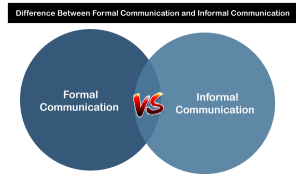Class VI: Page: 2/3; Talking to People
1.2: Look at the picture below. Then, ask and answer the following questions in pairs:

Can you guess who they are?
Ans: Yes, definitely I can guess.
What do you think is the relationship among them?
Ans: I think they are classmates as well as close friend also.
What do you think they are talking about?
I think they are talking about formal and informal expression. They may discuss the similarities and dissimilarities between formal and informal expression. Formal English expressions are used in formal letters or in situations involving people you do not know very well. The tone is respectful and polite. Informal English expressions are used in everyday conversations and emails exchanged with friends, colleagues or people you know well. The tone is casual and friendly.
1.3 Read the following list of formal and informal expressions and discuss their meanings in groups:
Formal Expression /
আনুষ্ঠানিক অভিব্যক্তি
|
Informal Expression
অনানুষ্ঠানিক অভিব্যক্তি
|
Hello! /
হ্যালো!
|
Hi! / Hey!
ওহে! / আরে!
|
It’s pleasure to meet you
আপনার সাথে দেখা করে আনন্দিত
|
Nice to meet you
তোমার সাথে দেখা করে ভালো লাগলো
|
I apologize
আমি ক্ষমা প্রার্থনা করছি
|
I’m sorry
আমি দুঃখিত
|
Much appreciated
অনেক প্রশংসিত
|
Thanks
ধন্যবাদ
|
Could you please help me?
দয়া করে আমাকে একটু সাহায্য করবেন?
|
Can you help me? Help me!
আপনি কি আমাকে সাহায্য করতে পারেন? আমাকে সাহায্য কর!
|
How are you doing?
তুমি কেমন আছ?
|
What’s going on? / What’s up?
কি হচ্ছে? / কি খবর?
|
Do you want to share?
আপনি শেয়ার করতে চান?
|
Want to share?
শেয়ার করতে চান?
|
| I’m not able to attend
আমি উপস্থিত হতে সক্ষম নই |
I can’t make it
আমি এটা করতে পারি না |
1.4 Read and practice the following two conversations with your friends.
Sample 1
Rifat : Hello!
রিফাত : হ্যালো!
Minhaj : Hello!
মিনহাজ: হ্যালো!
Rifat : It’s please to meet you.
রিফাত : আপনার সাথে দেখা করার জন্য অনুগ্রহ করে।
Minhaj : Same Here.
মিনহাজ: এখানেও তাই।
Rifat : I went to your house yesterday but didn’t find you?
রিফাত : গতকাল তোমার বাসায় গিয়েছিলাম কিন্তু তোমাকে পেলাম না?
Minhaj : I apologize.
মিনহাজ: আমি ক্ষমাপ্রার্থী।
Rifat : Much appreciated.
রিফাত : অনেক প্রশংসা।
Minhaj : Could you please help me?
মিনহাজ: আপনি কি আমাকে সাহায্য করবেন?
Rifat : Yes, of course. It’s pleaser to me.
রিফাত : হ্যাঁ, অবশ্যই। এটা আমার কাছে আনন্দদায়ক।
Minhaj : How are you doing?
মিনহাজ: কেমন আছেন?
Rifat : I am going well. Thank you very much.
রিফাত : ভালোই যাচ্ছি। আপনাকে অনেক ধন্যবাদ.
Minhaj : I was unable to attend my last English class.
মিনহাজ: আমি আমার শেষ ইংরেজি ক্লাসে যেতে পারিনি।
Rifat : Do you want to share?
রিফাত : আপনি কি শেয়ার করতে চান?
Minhaj : No, I just want you to help me doing the home work.
মিনহাজ: না, আমি শুধু চাই তুমি আমাকে বাড়ির কাজে সাহায্য কর।
Rifat : I apologize. I’m not able to attend.
রিফাত : আমি ক্ষমা চাইছি। আমি উপস্থিত হতে সক্ষম নই।
Minhaj : Al right, much appreciated.
মিনহাজ: ঠিক আছে, অনেক প্রশংসা।
Sample 2
Rifat : Hi!
রিফাত : হাই!
Minhaj : Hey!
মিনহাজ: আরে!
Rifat : Nice to meet you.
রিফাত : আপনার সাথে দেখা করে ভালো লাগলো।
Minhaj : Same Here.
মিনহাজ: এখানেও তাই।
Rifat : I went to your house yesterday but didn’t find you?
রিফাত : গতকাল তোমার বাসায় গিয়েছিলাম কিন্তু তোমাকে পেলাম না?
Minhaj : I am sorry.
মিনহাজ: আমি দুঃখিত।
Rifat : Thanks.
রিফাত : ধন্যবাদ।
Minhaj : Can you help me? / Help me!
মিনহাজ: আপনি কি আমাকে সাহায্য করবেন? / আমাকে সাহায্য কর!
Rifat : Yes, of course. It’s pleaser to me.
রিফাত : হ্যাঁ, অবশ্যই। এটা আমার কাছে আনন্দদায়ক।
Minhaj : What’s going on? / What’s up?
মিনহাজ: কি হচ্ছে? / কি খবর?
Rifat : I am going well. Thank you very much.
রিফাত : ভালোই যাচ্ছি। আপনাকে অনেক ধন্যবাদ.
Minhaj : I was unable to attend my last English class.
মিনহাজ: আমি আমার শেষ ইংরেজি ক্লাসে যেতে পারিনি।
Rifat : Want to share?
রিফাত : শেয়ার করতে চান?
Minhaj : No, I just want you to help me doing the home work.
মিনহাজ: না, আমি শুধু চাই তুমি আমাকে বাড়ির কাজে সাহায্য কর।
Rifat : I can’t make it. I’m not able to attend.
রিফাত : আমি পারবো না। আমি উপস্থিত হতে সক্ষম নই।
Minhaj : Al right, much appreciated.
মিনহাজ: ঠিক আছে, অনেক প্রশংসা।

Formal communication often follows a specific structure or channels such as emails to the clients, whereas informal communication can often flow freely in any direction.
| Formal Expression | Informal Expression |
| 01. Formal communication is defined as the communication which takes place through formal/ official routes and channels.। | 01. On the other hand, informal communication is defined as the communication which takes place unofficially between two or more people. |
| 02. The process of formal communication is slow. | 02. The process of informal communication is rapid. |
| 03. Formal communication is time-consuming. | 03. Informal communication is very fast and rapid. |
| 04. The main aim of formal communication is to fulfill organizational objectives. | 04. The main aim of informal communication is to meet personal interests and needs. |
| 05.Formal communication network may be both written and oral. | 05.Formal communication network may be oral. |

